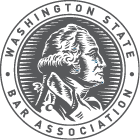Networking is essential, as only about 25% of jobs are found online. Furthermore, the social skills and network of contacts that you develop through Informational Interviewing will support your career after you land the job. These contacts will turn into referrals for your office and valued advisers for your career. A book that really sets the stage for building a network of connections is "Never Eat Alone" by Keith Ferrazzi.
Informational Interviewing means engaging a relative stranger, building rapport, and learning from their experience. Perhaps they have something to offer you. Remember, you're not meeting other lawyers and other professionals to ask for a job; you're meeting them as a peer to share knowledge and experiences. This is an opportunity to share interests find out if you can relate to them constructively.
Job consultant Paul Anderson spoke at the WSBA on "The Psychology of Interviewing." He explained how to make these interviews meaningful. Note the importance of creating a value proposition with each contact. This takes the emphasis off of "does this person care about me" and focuses upon "how can we be useful to each other." A summary of points covered in Paul's presentation is included in The Psychology of Interviewing.
Build a database! It's easy to lose sight of the effort we've already made to find work. The trick to building a network of supporters, according to legal staffing consultant Jeff Minzel, is to train them to find you a job. This means following up with at least five unintrusive contacts. It can include emails, phone calls, thank-you notes, forwarding articles of interest, etc. By maintaining a database, you will know when you last contacted each person and how to keep yourself on their radar.
Informational Interviewing is not a skill set they teach in law school. Calling a stranger, explaining how you heard about them, and hoping they'll have coffee with you isn't easy for most people. But there are ways to reduce the intimidation factor. Join a section the best matches your practice area and attend its meetings and CLEs. Figure out who you might benefit from knowing. Talk to CLE presenters and invite them to coffee; they are among the most outgoing members of the bar and usually happy to share what they know.






